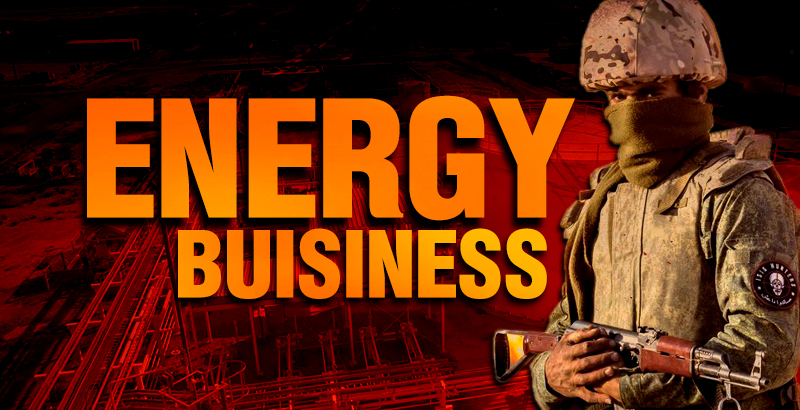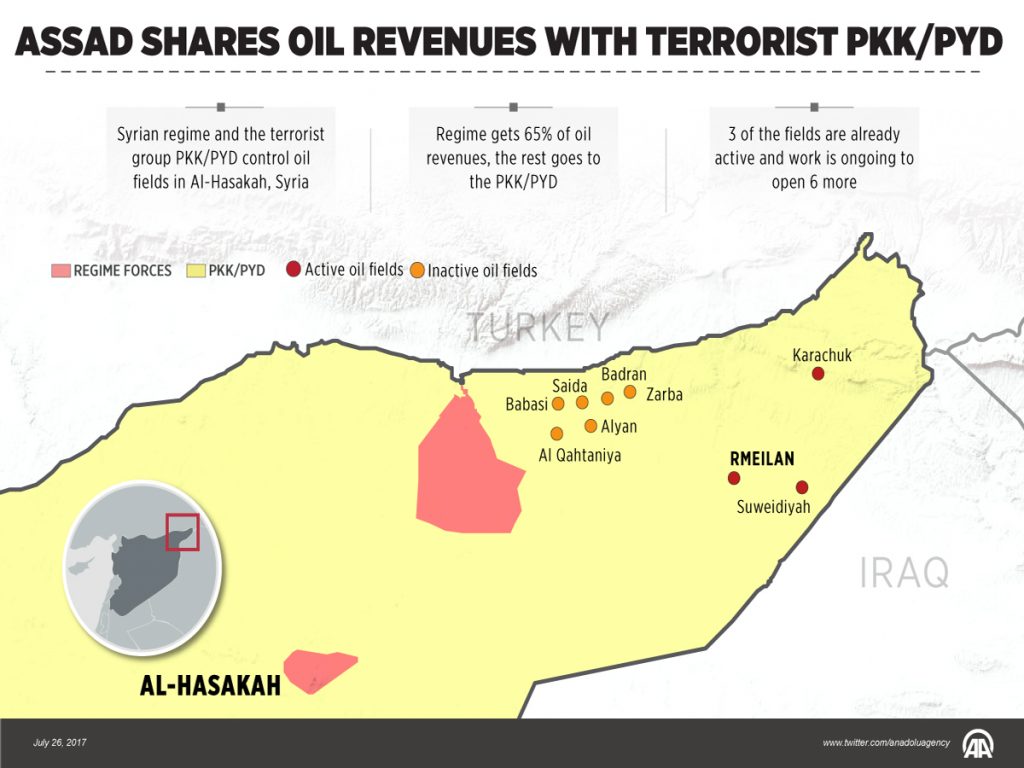
In the early part of August 2017, Reuters claimed that at least 40 Russian MoD and Private Military Companies (PMCs) servicemen have been killed in Syria so far this year alone.
At least 21 of them, according to Reuters, worked in PMCs linked with Russia.
The official Russian response: “One should rely on official data published by the Ministry of Defense. If there are Russian citizens in Syria as volunteers, they have nothing to do with the state.”
Shortly after the Reuters report, a novel version of the causes of the majority of Russian losses in Syria appeared in the Russian media by an author writing under the pseudonym of “Mikaprok”, who referred to this theory as anecdotal, but worthy of consideration.
The thrust of the article is that the killed PMC servicemen performed gas pipeline construction security duties. Some of this information has been verified and up-to-dated by SouthFront, while the remainder is at best a hypothesis.
In early June 2017, Russia-based Stroytransgaz Logistics, which is owned by Stroystrangaz and Gennadiy Timchenko, returned to Syria. They officially declare about their engagement in a project to restore Syria’s largest phosphate mining operation near Palmyra.
OAO Stroystrangaz is a Russian oil and gas engineering and construction company. Founded in 1990, it was originally a subsidiary of Gazprom, though now it is controlled by Gennadiy Timchenko through his Volga Group SICAV SIF SA fund.
Gennady Timchenko is a Russian businessman and billionaire. He founded and owns the private investment group, Volga Group, which specializes in investments in energy, transport and infrastructure.
The contract with Stroytransgaz was signed by the Syrian authorities on December 9, 2016. However, the work went slowly.
In March 2016 it was reported that the Syrian troops had established control over the mines, but in December ISIS returned to the region. It was possible to resume the work only in May 2017.
Stroytransgaz and the Ministry of Natural Resources of Syria have a long-term partnership. Before the war in Syria began, the Russian company had built a gas refinery plant in Syria and a gas pipeline. Now in the vicinity of the city of Raqqah the company is building a second stage of another gas refinery plant with a capacity of 1.3 billion cubic meters per year. The first stage of this enterprise was introduced in November 2014.
According to Turkish media, the Syrian government already manages at least three oil fields in the Hasakah Province, in the territory controlled by the Syrian Democratic Forces (SDF). According to media reports, the SDF receives 20% of the profit for ensuring the safety of the fields.
So there are good grounds and opportunities for Russian companies building and operating oil and gas infrastructure.
Also according to unconfirmed information, one more Russian company, SoyuzNefteGaz, has resumed its operations in Syria. A chairman of the board of SoyuzNefteGaz, Yuri Shafranik, reportedly signed agreements to conduct exploration work on the Mediterranean coast of Syria in 2013. The company invested about $ 90 million in research activities over the next 2 years.
Soyuzneftegaz is a Russian oil and gas company. It is headed by Russia’s former energy minister Yuri Shafranik. The Interstate Bank of the CIS holds 30% and SNG Holding holds 70% of shares.
In October 2004 Soyuzneftegaz won a tender in Syria for the onshore Blocks 12 and 14 near Iraqi border. In 2006, the company decided not to continue with the development of Block 14, but continued work on Block 12. In 2005, Soyuzneftegaz acquired a 50% working interest in Block 26 in the northeast of Syria through its wholly owned subsidiary SNG Overseas. On 25 December 2013, Soyuzneftegaz signed a 25-year agreement to prospect for more oil in Syria. The company stopped its operations in Syria in 2015 because of the war.
Earlier in 2010, this very area between Tartus and Banias was thoroughly investigated by CGGVeritas which estimated there the presence of 122 TCF of natural gas. Presumably this is the third largest undeveloped deposit in the world.
CGGVeritas Services SA provides geophysical services such as data acquisition, supervision, and logistical support for the seismic operations of the oil and gas industry. In addition, the company provides technical support, maintenance, and design services for the multi-streamer vessels. CGGVeritas Services SA was formerly known as CGG Services SA and changed its name to CGGVeritas Services SA in February 2011. The company was incorporated in 1996 and is based in Massy, France. As of December 22, 2000, CGGVeritas Services SA operates as a subsidiary of CGG.
Nearly all major European players, such as Eni, Shell and Total, participated in the project during 2011-2013. Total played a role as a link between StroyNefteGaz and Shell.
However, active fighting soon broke out in the region, so, in 2015, according to Yuri Shafranik quoted by Bloomberg, “SoyuzNefteGaz” stopped its work on the development of deposits.
«Mikaprok» in his article assumes that since the spring of 2017 the work on development of deposits had been resumed. At the same time, there is a requirement to protect and control the massive territory of the Raqqa-Latakia-Tartus area. That is why Russian PMCs have been widely involved, leading to such distribution of total Russian losses in Syria from the beginning of the year.
Meanwhile the forces loyal to the Syrian government are conducting a large-scale operation against ISIS in the central Syria. The expulsion of terrorists from the area north of the highway connecting the cities of Palmyra and Homs and other areas, will ensure security at numerous deposits in the vicinity of Palmyra and Raqqa.
The recent air assault operation by government forces in the area with the official assistance of Russian advisers also suggests that Moscow is interested to gain control over this territory as soon as possible.









F… the oil and f… the gas. The real wealth is water and brain.
Don’t forget electricity. =)
No water and no brain = no electricity. You can’t drink or eat oil and gas.
It’s useful when you know how to get it and how to use it. Otherwise, it’s more a curse.
Electricity truly is a result of both, oil and gas isn’t and will never be. =)
The future is electric, oil and gas will scale down accordingly, while electricity is taking over. Even coal will scale down, only being used for steel production at one point.
The whole mobility will turn to electrics vehicles (EV), ships and even planes in the next two decades, for planes probably taking longer, due to effectivity issues.
I don’t think that electric is more reliable than oil and gas. Electric has a big weakness : storage and batteries. And Bolivia will be invaded because of stock of lithium.
I have never understood why countries that have oil and gas sell it instead of keep it for them.
The financial system being employed is meant to make countries export their goods, but that is a complete different story anyway.
The good thing about electricity is, you can produce it everywhere. The battery and storage issues are currently going on par with the fossil fuels and technologies. However, the fossil technology had its main development phase in the past, while the electricity with the storage capacity and all surrounding technologies are only starting to develop now. Around 2020 – 2022 solar energy will be the cheapest way to produce energy. And you can produce this form of energy from everywhere, there is no need for an oil well, the sun is there for everyone.
Currently, the early adopter phase is in full swing, with the regular phase already beginning within the next two years.
The amount of electric vehicles (EV) being offered will grow very quickly. Every car manufacturer that isn’t developing EVs yet risks not to exist anymore within the next decade.
The world is changing drastically, Syrian oil and gas will matter less than ever before, so will it be for any other country, including the USA with their fracking madness, the first to go out of business.
That’s for the countries that can master this technology. And, it will be less practical and less reliable than oil. When you want ta take your electric car, you must be sure that the batterie is full and functionnal. Otherwise, you have to wait I don’t know how many hours in order to the battery to be full. Or, you have to change the battery yourself. Also, in electric cars, you will rent baterries. Each month, you will pay for the battery, even if you don’t use your car. With, oil, you just put oil on the car and you are good to go. Electric will less practical.
That’s why, I suggest countries that still have oil and gas to not sell but to keep it at all cost.
It is apparent that you are not familiar with this topic, which is fully ok, as our politics are not even touching this topping, they are that scared. =)
It’s part of the fourth industrial revolution, which currently starts to take on speed.
Charging an EV currently takes between 15 – 30 minutes on a quick charger, with a normal charger up to 6 hours (usually over the night). Rough range would be 200 miles with the smaller EVs.
Electric technology will turn out easier to adopt then the current fossil fuel technologies, with other words, offers better chances for developing countries.
Anyway, we are quite off topic now. =)
I’m not that optimistic. And if you think about trucks, tractors, planes, boats, industry, …. I think that it will be rather a nightmare. Imagine the logistic to change the baterries of planes on airport and store them and recycle. XD.
Just your simple AA battery discharges itself even if you have never use it.
Trucks and tractors will exchange them anyway. Trucks usually are always using the same routes anyway, at strategic positions their batteries are exchanged, very easy, but the infrastructure has to be built. The same for tractors, which are always working in the same areas. A tractor working in the fields will be able to exchange the battery itself, just a matter of technical solution.
Boats? Well, ships! =) Every harbor has electricity anyway, just a matter of infrastructure change. The first projects are already in the works. For small boats it’s not an issue at all, as long as there is an infrastructure for electricity in the first place.
Planes might still take around 30 – 50 years, depending on technological developments.
Diesel fuel can’t be stored for longer times too, as it would flock out. As such, batteries are not alone with this. =)
Contrary to your beliefs on battery storage capacity and the end of oil and gas is very naive since the EVs are still decades off of being more cost efficient. The current waste from this industry is far more costlier and harmful to the environment. There wont be an end to petroleum since they could use Natural Gas to produce electricity and use the oil and gas in plastics is a major component in today’s market and Recycled has limited uses.
The harsh elements of some nations eliminate this viability of the EVs since electricity is adversely affected by it. There are still so many risks that the eventual use of it will be take decades to work on and human and environmental risks are still huge.
Depends on which battery we are talking about. The German cars have raw materials in their batteries, which causes a lot of costs and isn’t very ecosphere friendly. However, the batteries from the USA (Tesla) do not use raw materials (but still cobalt), they mainly need Lithium, which is more than abundant. Furthermore, they can recycle their batteries to more than 90% already, aiming at nearly 100%.
The impact on the ecosphere is less than exploring and exploiting oil, while it isn’t neutral either.
As you are referring to the harsh weather conditions, Norway doesn’t have an issue with it. In fact, the EVs there are just equipped differently. Already the majority of cars, which are newly registered, are EVs in Norway. Regarding desert countries, there is no real issue left anymore too. The developments for batteries are taking up speed at the moment, similar to ‘Moores law’ for computers. But for computers, it finally starts to slow down now, the miniaturization reached its possibilities, at least for the moment.
However, the complete change of the car setup in the different countries will still take several decades anyway, depending on the countries.
Plastic products are actually becoming cheaper, due to the dropping demand for oil in the first place. We are already now in a price low for oil. The amount of oil being used overall will drop within the next years.
Gas most likely will be the last of the fossil fuels being used. How long these changes will take, difficult to say.
But to get water & get it to where you need it. You need Electricity. To get that you need Gas & Oil. Even the heavy solar & wind farms. usually only 5-10% of a countries needs are produced. The efficient tech is just not there yet. But getting there. the sooner the better. BTW . A new wifi systems was developed that’s 100 times faster. Say goodbye to wired internet. Will be like Cell phones.
actually, you can eat as a result of oil and gas.
No car for you!
Venezuela might create a couple of PMC’s to help Syria out , they can use the cash , and Syria can use experienced oil field help .
So what’s the reason for RU military intervention in Syria? It seem like everybody has turned blind eye to it here? The water and brain or electricity have been discussed. So what that has to do with geopolitics and the energy interests of Putin’s oligarchs in Syria? So what happens to Iranian and Qatary gas pipeline? Has RU perhaps intervened in Syria to prevent Qatary and Iranian gas reach EU market where it holds monopoly. Just a food for thought. Or how’s Syrian government paying for RU military adventure in ME? How all that works for the common good of ordinary Syrian people? And thank you SF for reveling intentionally or not what has been going on in Syria behind the curtain.